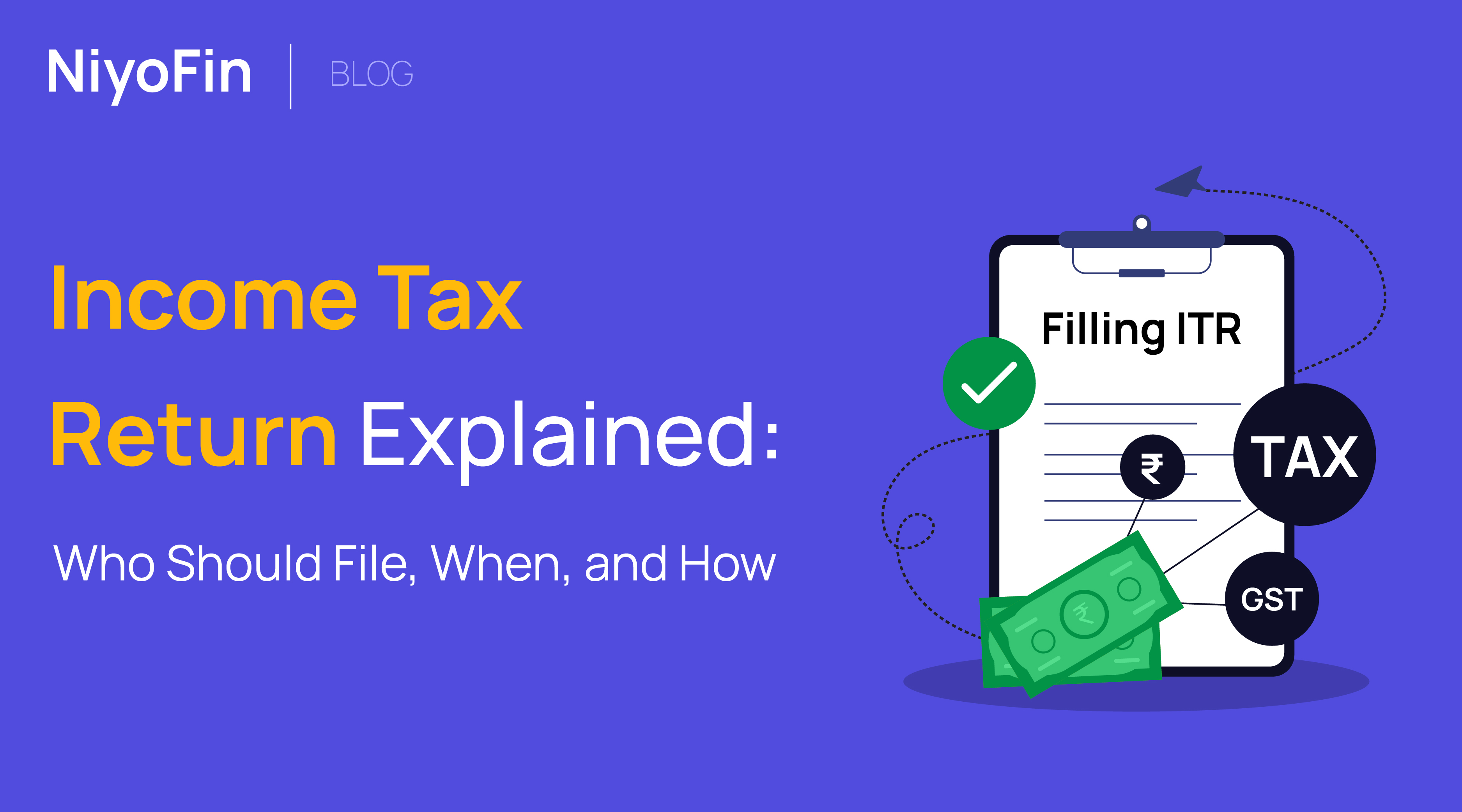
Income Tax Return Explained: Who Should File, When, and How

Always juggling with Income Tax Return complexities? No worries, Niyofin has got you covered. This guide is designed to simplify things for you on ITR filing in India, who should file, forms, deadlines, benefits, and the potential mistakes to avoid strictly.
What is an Income Tax Return (ITR)?
An Income Tax Return (ITR) is a document you file with the Income Tax department by the end of every financial year. It showcases your income, deductions, investments, and the tax you owe or already paid.
Filing an ITR isn’t merely paying tax; it’s more about staying compliant, maintaining financial records, and even unlocking benefits like faster loans and visas.
Why Filing ITR Matters
It is a common assumption that only the wealthy or salaried need to file an ITR. Not true. Here are 5 reasons why filing ITR can be an important aspect for you:
- Legal compliance – It’s your duty under Indian tax law.
- Proof of income – Essential for credit cards, loans, and visa applications.
- Claiming refunds – If you paid extra tax (via TDS or advance tax), you only get it back by filing.
- Avoiding penalties – Missing ITR deadlines can lead to penalties and interest.
- Building credibility – A consistent filing record strengthens your financial profile by showing you’re compliant with Indian Laws.
Who Should File ITR?
You need to file ITR if any of the following apply:
- Your total income exceeds ₹2.5 lakh in a financial year (before deductions).
- You want to claim a refund on excess tax deducted.
- You had income from more than one source (salary, rent, freelancing, interest, etc.).
- You are an NRI earning income in India.
- You made significant deposits or investments above the prescribed limits.
Even if your income is below the taxable limit, filing voluntarily helps build a clean financial history.
Types of ITR Forms (Made Simple)
The Income Tax Department has different ITR forms based on income type. They are:
- ITR-1 (Sahaj): For salaried individuals with income up to ₹50 lakh.
- ITR-2: For individuals with capital gains, foreign income, or income above ₹50 lakh.
- ITR-3: For those with business or professional income.
- ITR-4 (Sugam): For small businesses and presumptive taxation scheme users.
- ITR-5/6/7: For firms, companies, and trusts.
All this sounds confusing, right? Especially when you do not know anything about it. But don’t worry, we’ve cracked it for you. At Niyofin, we’ve broken down the forms in a way that’s simpler, smarter, and personalised to your needs - without the confusion.
Want total clarity on which form is right for you?
👉 Check out https://niyofin.com/pricing - where we guide you step by step, at transparent pricing that makes sense.
ITR Deadlines You Can’t Miss
ITR Filing Deadlines for FY 2024-25 (AY 2025-26)
💡 Important Update: The ITR filing deadline for individuals and HUFs (who are not required to get their accounts audited) has been extended to 15th September 2025. As notified by the CBDT, this is an extension from the usual 31st July deadline.
Missing this deadline can cost you:
- Late filing fees under Section 234F
- Interest charges under Section 234A
If you still miss the deadline, you can file a belated return up to 31st December 2025: but remember, interest and penalties will apply.
Income Tax Filing Due Dates for FY 2024-25 (AY 2025-26)
|
Category of Taxpayer |
Due Date |
|
Individuals / HUFs / AOPs / BOIs (no audit required) |
15th September 2025 |
|
Businesses requiring audit |
31st October 2025 |
|
Businesses with transfer pricing reports (international/domestic transactions) |
30th November 2025 |
|
Revised return |
31st December 2025 |
|
Belated / late return |
31st December 2025 |
|
Updated return |
31st March 2030 (up to 4 years |
✅ Pro Tip: Don’t wait until the last week!! IT portals often slow down as the deadline approaches. Filing early saves you stress and avoids last-minute errors.
Common Mistakes to Avoid
Many taxpayers end up with notices or delays due to simple errors. Avoid these:
- Forgetting to report interest income from savings and FDs.
- Mixing up the correct ITR form.
- Claiming deductions without valid proof.
- Skipping e-verification after filing.
- Waiting until the last day (risk of technical glitches).
Filing ITR is Easier Than You Think with Niyofin
Filing ITR must be a financial habit that protects your money, builds credibility, and ensures peace of mind. Whether you’re a first-jobber, freelancer, business owner, or NRI, staying tax-compliant is the smartest financial move you can make.
At Niyofin, we’re here to make tax filing simple, stress-free, and error-free.